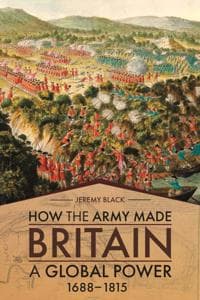
How the Army Made Britain a Global Power
794 kr
794 kr
På lager
Ti., 21 jan. - fr., 24 jan.
Sikker betaling
14 dagers åpent kjøp
Selges og leveres av
Adlibris
Produktbeskrivelse
Between 1760 and 1815, British troops campaigned from Manila to Montreal, Cape Town to Copenhagen, Washington to Waterloo. The naval dimension of Britain’s expansion has been superbly covered by a number of excellent studies, but there has not been a single volume that does the same for the army and, in particular, looks at how and why it became a world-operating force, one capable of beating the Marathas as well as the French. This book will both offer a new perspective, one that concentrates on the global role of the army and its central part in imperial expansion and preservation, and as such will be a major book for military history and world history. There will be a focus on what the army brought to power equations and how this made it a world-level force. The multi-purpose character of the army emerges as the key point, one seen in particular in the career of Wellington: while referred to disparagingly by Napoleon as a ‘sepoy general,’ Wellington’s ability to operate successfully in India and Europe was not only impressive but also reflected synergies in experience and acquired skill that characterised the British army. No other army matched this. The closest capability was that of Russia able, in 1806-14, to defeat both the Turks and Napoleon, but without having the trans-oceanic capability and experience enjoyed by the British army. The experience was a matter in part of debate, including over doctrine, as in the tension between the ‘Americans’ and ‘Germans,’ a reference to fields of British campaigning concentration during the Seven Years War. This synergy proved best developed in the operations in Iberia in 1809-14, with logistical and combat skills utilised in India employed in a European context in which they were of particular value. The books aims to further to address the question of how this army was achieved despite the strong anti-army ideology/practice derived from the hostile response to Oliver Cromwell and to James II. Thus, perception and politics are both part of the story, as well as the exigencies and practicalities of conflict, including force structure, command issues, and institutional developments. At the same time, there was no inevitability about British success over this period, and it is necessary to consider developments in the context of other states and, in particular, the reasons why British forces did well and that Britain was not dependent alone on naval effectiveness.
Artikkel nr.
806c58e2-5385-44f0-8bcd-523323939edb
How the Army Made Britain a Global Power
794 kr
794 kr
På lager
Ti., 21 jan. - fr., 24 jan.
Sikker betaling
14 dagers åpent kjøp
Selges og leveres av
Adlibris
Lignende toppselgere

Generic
Øreputer for Bose QuietComfort - QC35/QC25/QC15/AE2 Hodetelefoner Svart
99 kr
4,5(710)
mandag, 20 jan.

KIRKLAND
6x60ml = 360ml - Kirkland Extra Strength 5% Men Hair Regrowth 60ml Hair Loss
1 290 kr
5,0(5)
fredag, 17 jan.

INF
Universallader for Garmin klokker
83 kr
Tidligere laveste pris:
90 kr
4,3(262)
fredag, 17 jan.

Maaleo
Dobbeltsidige tusjer/penner - 168 stk. MAALEO 24101
399 kr
5,0(1)
torsdag, 30 jan.

Generic
2-Pak - iPhone Lader Adapter+Kabel 20W USB-C Hurtiglader
199 kr
3,7(501)
mandag, 20 jan.

INF
INF Tilbehør Roborock S6/S60/S65/S5 Max/T6, 20 deler
289 kr
Tidligere laveste pris:
383 kr
3,3(23)
torsdag, 16 jan.

INF
INF Sklisikker beskyttelse / brodder for sko med 18 stålpigger (L)
216 kr
4,5(20)
torsdag, 16 jan.

J&EL
J&EL Gulvovn 2000W Hvit 2.0
199 kr
Tidligere laveste pris:
599 kr
mandag, 13 jan.

Odin
Titan Silikon Til Tredemølle 100ml
149 kr
Tidligere laveste pris:
349 kr
5,0(4)
fredag, 17 jan.

Megabilligt
Galaxy Lamp - Nebula Star -projektoren med fjernkontroll
499 kr
Tidligere laveste pris:
909 kr
3,9(26)
mandag, 20 jan.
Anbefalinger til dig

Nördic
NÖRDIC 192kHz DAC Digital til Analog Converter SPDIF Toslink til Analog Stereo RCA L/R
350 kr
4,1(12)
fredag, 17 jan.

Generic
2-Pak - PS4 Kontroll DoubleShock for Playstation 4 - Trådløs
549 kr
4,4(7)
mandag, 20 jan.

Northix
UV-lampe for gellakk - bevegelsessensor - 48 w
249 kr
4,8(17)
onsdag, 15 jan.

INF
INF Tilbehør til Roborock S5/S6 modeller 7 deler
181 kr
Tidligere laveste pris:
221 kr
4,2(48)
torsdag, 16 jan.

Mobil o Teknik
Blodtrykksmåler for overarmen med minnefunksjoner
249 kr
Tidligere laveste pris:
269 kr
4,0(145)
tirsdag, 21 jan.

Toppik
Toppik - 27,5g - Dark Brown - Mørkebrun
285 kr
4,4(11)
fredag, 17 jan.

DualSense Nova Pink - PS5
799 kr
5,0(5)
fredag, 17 jan.

INF
INF Babymonitor med kamera 2.4G-overføring, 2-veis lyd, infrarødt nattsyn
798 kr
Tidligere laveste pris:
1 043 kr
5,0(3)
torsdag, 16 jan.

PlayStation 5 Slim Digital Edition (PS5)
5 789 kr
4,4(38)
fredag, 17 jan.

INF
INF AirTag-holder, 2 stk. Flerfarget
86 kr
4,1(39)
fredag, 17 jan.